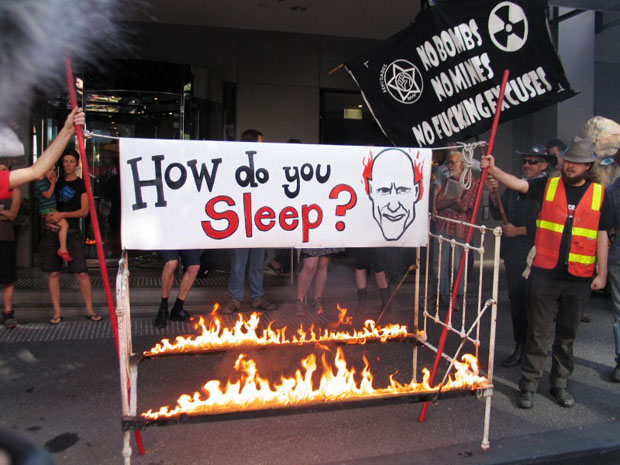Peter Garrett, the 1980s rock star in a band noted for its anti-nuclear, anti-mining, anti-military stance, is living proof that parliamentarism will never serve the campaigns for social, environmental and economic justice.
In just one term as minister for the environment in the Rudd government, Garrett made a transition from hero to zero of environment activists with his (un)impressive record of switchbacks and sell-outs. The Gunns pulp mill project in Tasmania, the end of a solar rebate scheme because it was “too successful”, the NT intervention into Aboriginal communities, approving the expansion of uranium mining in South Australia – all got the nod from Garrett.
Credibility turned to a chorus of incredulity not long into Garrett’s term in government. In a September 2007 blog on Paradigm Oz, an activist going by the initials J.T. opined “Whatever happened to the revolution?:
“[As lead singer in Midnight Oil, Peter Garrett sang] ‘The time has come to say fair’s fair, to pay the rent, to do our share’.
“In the debate in federal parliament around the government’s intervention into Northern Territory Aboriginal communities Garrett told the parliament of his in principle support for the intervention, even though it includes undoing the Northern Territory Land Rights Act, racial discrimination act and has been unanimously criticised by the Northern Territory Aboriginal communities that it has been imposed onto … Garrett has willingly accepted his dog collar and short leash. He has become another mouthpiece for the machine that perpetuates Aboriginal oppression and global war.”
At the ALP’s 2007 national conference in Sydney, noted mainly for its dropping of the ALP’s “three mines policy” to allow an expansion of uranium mining, Garrett’s last gasp of credibility was expended when he told the conference: “I have always maintained and indeed committed myself to the notion that Australia should be nuclear free – that our country is as far into nuclear activities as it ever should be … I have long been opposed to uranium mining, and I remain opposed to it … My reason for this objection is based on the principle that I believe no generation should appropriate the future. The risks are greater than the benefits. And with radioactive waste, no issue has a greater purchase on the future than this issue does.
“Uranium mining leads inextricably to uranium waste. Radioactive waste is toxic material which lasts for tens and hundreds of thousands of years … at the end of the day, we cannot absolutely guarantee Australian uranium won’t end up in nuclear weapons – but we can guarantee all Australian uranium will become nuclear waste.”
Less than two years later, Garrett as environment minister was defending the Rudd government’s approval to expand uranium mining in South Australia.
During the peak of the anti-nuclear movement in the mid-1980s, 10,000 people joined the Nuclear Disarmament Party (NDP). Peter Garrett joined the day before he was preselected as a candidate for the 1984 federal elections. Frustrated in their attempts to turn the NDP away from campaigning and into an electoral vehicle, Garrett and a small group of “media mega stars” walked out of the NDP at its inaugural conference, only nine months after its formation, rather than be accountable to the NDP membership. This stunt played straight into the hands of the capitalist press, which was keen to discredit the anti-nuclear and peace movement, which was pulling tens of thousands of people into street protests and which garnered more than half a million primary votes when it stood in the 1985 elections. The Labor Party was naturally threatened by this phenomenon and played many dirty tactics to disrupt the NDP.
Garrett found a natural home in the ALP some 22 years later, when he was “parachuted” into preselection and then awarded the title of federal environment minister in the Rudd government. He quickly displayed the mind and spirit of capitalist parliamentary politics – using buzz words, spin and careful phrasing to mask the reality of adverse decisions.
‘Listened carefully’
In a January 5, 2009, statement to the press conference on construction approval for the Gunns pulp mill, Garrett demonstrated his complete subservience to big business as usual:
“I’ve listened carefully to public views and considered closely all the relevant scientific material departmental and legal advice necessary to make an informed decision … I take my responsibilities as environmental regulator very seriously … As federal environment minister my statutory jurisdiction is limited to defined matters of national environmental significance … This decision is consistent with my role … and is consistent with Australian law and consistent with the expectations of the Australian community.”
While there are no Garrett-type puppets gaining comparable publicity in any peace or anti-nuclear campaigns at the moment, we now have bitter proof that the opportunism rewarded by the Labor Party (a safe seat here, a ministerial position there) is a dead end for the campaigns such people claim to represent.
During the heady days of the NDP, when 3500 people packed town halls to cheer on radical speakers and hundreds enthusiastically attended local branch meetings, socialists campaigned to keep decisions democratic, to keep discussion open and to air and resolve differences. The lesson from Peter Garrett is that we need a movement of committed activists who can see beyond parliament and the dead hand of the ALP and can commit to the struggle of building democratic, accountable campaigns for peace, the environment and social justice.

